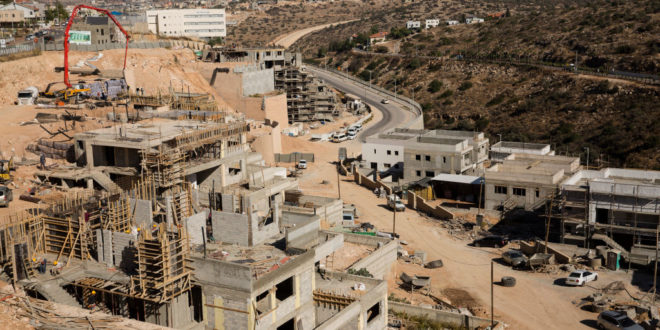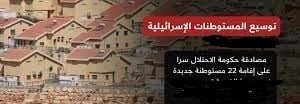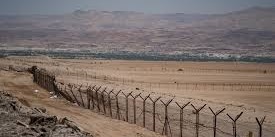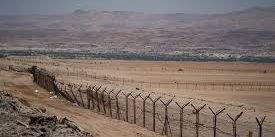By: Madeeha Al-A’raj
The occupation government had suspended approval of construction bids in settlements in order to pass peace and normalization agreements, which were being prepared with the United Arab Emirates and the Kingdom of Bahrain. It is a process of deception and collusion taking place between the American administration, ambassador David Friedman, Netanyahu and United Arab Emirates’ officials to pass the signing of the agreements first, then stopping the suspension of construction tenders and starting a new wave of construction in settlements not only in Jerusalem and its surroundings, but also in settlements located in the West Bank, such as, the Bracha that was established on the Nablus Mountains.
Last week report of the National Bureau for Defending the Land and Resisting Settlement indicated that Netanyahu in agreement with Gantz had given the green light to hold a meeting after Oct. 10th of the so-called Planning Council at the Israeli Civil Administration to approve the construction of new settlement units in the West Bank, after he agreed to approve the construction of more than 5,000 housing units, after freezing planning and construction in the West Bank since February, to satisfy the US Administration and not to jeopardize normalization agreements with the UAE and Bahrain. In recent days, there have been contacts between settlement officials in the West Bank with Netanyahu, in which they demanded an end to the freeze and threatened to protest against him, which could put him in a critical political position.
Moreover, it was agreed to hold a meeting to approve a plan for building 5,400 new housing units, most of which to be built in the Beitar Illit Settlement, 629 housing units in the Eli Settlement near the Qariot, Al-Sawiyah and Al-Laban Al-Sharqiya villages, 560 units in Gilo settlement south of occupied Jerusalem, 286 units in Har Bracha settlement, 120 units in Bani Kidem settlement. 181 units in the settlement of Einaf, 21 units in the Shama settlement outpost to the south of Hebron, besides plans to build 2,910 other housing units in a number of settlements, including 370 housing units in Givat Binyamin settlement and 354 units in Nili settlement.
This is being done along with the approval of the Local Planning and Building Committee of the occupation Municipality in Jerusalem to propose a plan to establish a settlement neighborhood on the lands of Sur Baher village, which includes the establishment of 450 settlement units, to the south of a settlement neighborhood, which the municipality began developing after the transfer of the US embassy to it, within a plan that includes the establishment of 1500 settlement units. The new settlement neighborhood is located at the western entrance to Sur Baher, adjacent to the street, which the occupation municipality is working to change its path to become a secondary street of the “American Street.” The project extends over an area of 57 dunums of agricultural land in addition to building commercial and public facilities on the site. This would seize more than 120 dunums in favor of establishing settlements and building bypass roads, and the village was besieged by a number of settlements, including “Armon Tzif” in the north and “Har Homa or Jabal Abu Ghneim” in the south And Ramat Rachel to the west, while the Apartheid Wall besieged it from the east, and there are huge infrastructure works taking place in the southeast of the village to extend “the American street” in preparation for isolating it and confiscating more of its lands.
On the other hand, violations and assaults by the occupation authorities and settler flocks against citizens and their properties continue, they demolish homes, destroy agricultural properties and uprooting olive and other fruit trees. In a recent report issued by the United Nations Office for the Coordination of Humanitarian Affairs (OCHA), the occupation authorities have demolished 506 Palestinian buildings in the occupied West Bank, of which 134 are in Jerusalem, since the beginning of this year, under the pretext of unauthorized construction, including 12 demolitions, 8 of which were carried out by owners themselves in order to avoid paying heavy fines if the occupation authorities and the municipality destroyed them. The UN Humanitarian Coordinator in the Occupied Palestinian Territories, Jimmy McGoldrick explained that the Israeli authorities, while practicing the demolition of homes or buildings invoke the lack of building permits, which for Palestinians to obtain is impossible due to the restrictive and discriminatory planning system, which leaves citizens with no choice but to build without a permit.
Within the context, Nikolai Mladenov, the UN Secretary-General’s envoy to the Middle East peace process confirmed his role during his monthly briefing before the UN Security Council on the situation in occupied Palestine saying “The settlements and home demolitions have not stopped.” On Security Council Resolution 2334 of 2016. Mladenov called on Israel to immediately and completely cease all settlement activities in the Occupied Palestinian Territory, including East Jerusalem, and to fully respect all its legal obligations in this regard. Responding to the United Nations reports on the situation in the occupied Palestinian territories, Germany, Belgium, France, Estonia and Ireland, which are members of the European Union in the current and upcoming sessions of the Security Council also called on Israel to respect and implement Security Council Resolution 2334, and expressed their deep concern about settlement activities.
List of Israeli Occupation and Settlers’ Assaults over the Last Week,
Documented by the National Bureau:
Jerusalem:
- Handing demolish orders for 2 houses of 60 meters each in Silwan, south of the Al-Aqsa Mosque, under the pretext of not having a building permit.
- Bulldozing land, demolishing tents and removing a fence in the Al-Isawiya village, for the second time in 2 months.
- Intensifying the incursions into the Al-Aqsa Mosque during the Al-Arsh and Farhit Al-Torah Eids, mobilize its efforts on all social media pages and through direct communication and text messages as well as distributed statements in the old town and Al-Buraq square calling for the necessity of using the US support to the Israeli positions and pushing towards erecting many Judaic projects.
Hebron:
- Tightening military surveillance measures in the Tel Rumeida Neighborhood in the center of Hebron under the pretext of securing Ramat Yeshai settlers.
- Demolishing 8 houses in the Mosafer Yatta area and 4 residential rooms made of brick and tin.
Bethlehem:
- Launching a surveillance balloon in the Um Rakbe area, south of the Khader town, south of Bethlehem, to monitor the citizens movement. It should be noted that the Israeli forces has launched three surveillance balloons within two weeks over the same area to destroy some facilities and notify homes of stopping construction as well as preventing urban expansion.
- Preventing the Palestinian farmers from reaching their land in the Husan village, near the Bitar settlement. They have also confiscated lands from Hussan, Nhalin and Fokin Valley during last June, changed their nature from agricultural to industrial, established recreational and administrative facilities and streets for settlers.
- Bulldozing lands and uprooting dozens of olive trees in the Khirbat Hamouda area in the Husan village. Demolishing retaining walls and a small tent used by farmers to store some tools for the cultivation and rehabilitation of their lands in the village.
- Erecting a fence at the main street in the Taq’o town in the Khirbet Al-Dier area, opposite the school complex, with a length of 150 meters, a height of two and a half meters and an area of 400 meters long, which will make it difficult for school students to reach the schools.
Nablus:
- Breaking into the southern area of the Qasra town, south of Nablus, in the area called Al-Wa’ar or Ras al-Nakheel, torched the agricultural lands and a car as well as breaking the windows of factories and chicken farms belonging to Palestinian citizens.
- Attacking Palestinian farmers working in their land, targeted poultry farms and broke their equipment in the south of the Qasra town.
- Injuring a Palestinian working in his land in the Asira Al-Qabliya town, south of Nablus, he was admitted to hospital for treatment.
- Demolishing a 500-meter barn on the entrance of Beita town, south of Nablus under the pretext of building in area C and not having an authorization from the Israeli civil administration.
Jordan Valley:
- Bulldozing lands of about 157 km near the Ma’ale Ephraim settlement on the eastern slopes of the mountains of the West Bank in an attempt to annex them within the areas of settlement expansion.
- Attacking workers in the project of installing water pipes for farmers as it stopped work in a water line, detained the workers and confiscated their Ids in the Atouf area in the northern Valleys.
- Demolishing 2 Palestinian homes in the Khirbet Yarza, in the northern Palestinian Valleys, left its inhabitants without shelter, including children, women and elderly, under the pretext of not having a building permit.
 المكتب الوطني للدفاع عن الارض ومقاومة الاستيطان منظمة التحرير الفلسطينية
المكتب الوطني للدفاع عن الارض ومقاومة الاستيطان منظمة التحرير الفلسطينية




